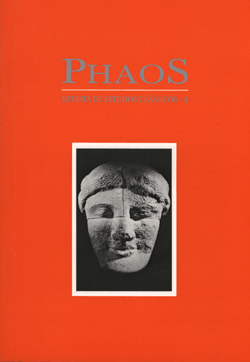Resumo
Ajax's dripping blood has special attributes, it is a "black force" expelled at the moment when the hero's story of individualistic anarchy is to be appropriated by his opposite: a more developed and centralized hierarchy, one closer to the expression of a more unified polis, articulated by his culto We face the contradictions evinced by the assimilation of violent insurrection (present in Ajax's myth) to the forms created to restrain aggression and opposition (implied by ritual). Against this background of violent ordering, the gushing of Ajax' blood contributes decisively to a sensation of tens e greatness that is essential to the sublime effect present in the scene. In this we see a potential ambiguity of all hero cults. A manifestation of the heroic power is the prototypical hero's reaction against the prospect of ordered culto Here, a long time after Ajax' death, his supernatural powers are at their highest. Ajax reacts even against the ineluctable experience of death. Many forces converge to articulate his power, which lies especially in his transitional state.
Referências
EASTERLING, P. E. 1993, 'Tragedy and Ritual' in Scodel 1993.
FYFE, W. H. 1999, transl., revised by Donald Russell, 'Longinus, On the Sublime', Cambridge.
GARVIE A. F. 1998, Sophocles Ajax, Warminster.
GOLDHILL, S. 1990, 'The Great Dionysia and Civic Ideology' in Winkler and Zeitlin 1990: 96-129.
HENRICHS, A. 1993, 'The tomb of Aias and the prospect of hero cult in Sophokles', Classical Antiquity 12, 165-80.
JEBB, R. C. 1896, Sophocles The Ajax, Cambridge.
KAMERBEEK, J. C. 1953, The Plays of Sophocles, The Ajax, Leiden.
LONGINUS, On the Sublime, 1995, transl. by W. H. Fyfe, revised by D. Russell, London.
SCODEL, R. 1993, Theater and Society in the Classical World, Ann Arbor.
SEAFORD, R. 1994, Reciprocity and Ritual: Homer and Tragedy in the Developing City-State, Oxford.
SEALE, D. 1982, Vision and Stagecraft in Sophocles, London.
SEGAL, C. 1981, Tragedy and Civilization, An Interpretation of Sophocles, Cambridge.
WEBSTER, T. B. L., 1936, An Introduction to Sophocles, Oxford.
WINKLER, J. and ZEITLIN, F. (orgs.) 1990, Nothing to do with Dionysos?, Princeton.
WINNINGTON-INGRAM, R. P. 1980, Sophocles, An Interpretation, Cambridge.

